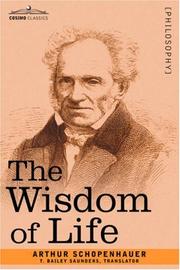Check nearby libraries
Buy this book

Nineteenth-century German philosopher Arthur Schopenhauer (1788-1860) championed individual strength of will and independent, reasoned deliberation above the irrational impulses that animated most of society. In The Wisdom of Life, taken from his last work, Parerga und Paralipomena (1851), he discusses how to order our lives to obtain the greatest amount of pleasure and success; then he offers guidelines for living life to its fullest. But for Schopenhauer a life well lived should always reach beyond itself to a higher plane.
Check nearby libraries
Buy this book

Previews available in: English French
Showing 5 featured editions. View all 34 editions?
| Edition | Availability |
|---|---|
| 1 |
aaaa
|
| 2 |
bbbb
|
| 3 |
bbbb
|
|
4
The wisdom of life, being the first part of Arthur Schopenhauer's Aphorismen zur Lebensweisheit.
1897, S. Sonnenschein & co.
- [6th ed.]
|
bbbb
|
| 5 |
bbbb
|
Book Details
First Sentence
"IN these pages I shall speak of The Wisdom of Life in the common meaning of the term, as the art, namely, of ordering our lives so as to obtain the greatest possible amount of pleasure and success; an art the theory of which may be called Eudoemonology, for it teaches us how to lead a happy existence."
The Physical Object
ID Numbers
Community Reviews (0)
History
- Created April 30, 2008
- 10 revisions
Wikipedia citation
×CloseCopy and paste this code into your Wikipedia page. Need help?
| April 29, 2011 | Edited by OCLC Bot | Added OCLC numbers. |
| August 12, 2010 | Edited by IdentifierBot | added LibraryThing ID |
| July 16, 2010 | Edited by WorkBot | merge works |
| July 16, 2010 | Edited by WorkBot | merge works |
| April 30, 2008 | Created by an anonymous user | Imported from amazon.com record |
















